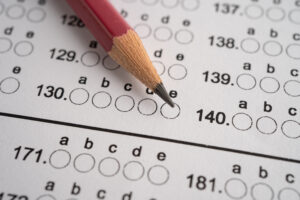Some students dread the SAT, others resign themselves to it, and still others take it gleefully. However they approach it, hundreds of thousands of students take the SAT every year. This is not without controversy, as many claim that the SAT is inherently biased, and that using it when making college admissions decisions is therefore unfair.
In this article, we’ll examine the research behind the reported bias in the SAT, to determine what truth there is to these claims. Further, we’ll see how this will affect you, and your test-taking endeavors. First, however, we’ll look at what the purpose of the SAT is, and why it’s relevant to this discussion.
What is the SAT?
Originally the SAT was called the Scholastic Aptitude Test but eventually dropped that moniker in favor of the initials alone. This name hints at the original purpose of the test: to determine not what a student knows, but their potential for learning. The SAT claimed to be able to determine how well a student would perform in college, and this is how it sold itself initially.
Colleges have always wanted to admit students who will be able to perform well, and the SAT claimed to be able to forecast future success. Further, the test is standardized, meaning every student takes the same test, regardless of location or preparation.
This is important because high school education is not standardized at all nationally. Students at a rural public school in Mississippi, a private boarding school in upstate New York, and a large public school in Los Angeles all have very different high school experiences and curriculums. All of these students, however, take the same SAT. This is intended to give schools a common ruler to measure students against.
The original SAT was blatantly discriminatory in the questions it asked, relying on cultural context unavailable to the majority of students, such as naming composers or knowing forms of higher art off-hand. There were a series of revisions to remove questions with these blatant biases, the latest coming in 2005. Now, the SAT claims, there are no more biased questions. So why is bias still considered an issue?
Is the SAT Biased?
The main charge of bias raised for the SAT stems from persistent score disparities. There are both racial and gender gaps in average test scores, which causes many to assume that the test itself is unfair.
The numbers themselves seem to support these claims. Men outscore women by an average of 37 points on the math section, and 7 points on the reading section. Asian students score the highest on average, with white students trailing them by 22 points on average, and black and hispanic students trailing white students by an average of 50 points. Finally, students who receive need based aid score an average of 20 points lower on both sections of the test.
However, just because there is a discrepancy in scores, does not mean the test itself is to blame. The College Board insists all score discrepancies are caused by differences in preparation, not inherent bias in the test. As the College Board is the publisher of the SAT, they are not the most neutral source. Fortunately, numerous articles have been written on the subject, several of them quite recently, arguing both sides of the issue.

Sources Against
In a 2018 paper “Eight myths about standardized admissions testing,” Paul Sackett and Nathan Kuncel argue that SATs are not inherently biased. This is based on how the SAT is able to predict first year grades in college, and how this tracks among groups. Their analysis concludes the SAT actually predicts higher success than is seen in grades for minority groups, and underpredicts how successful female applicants will be.
They use this analysis, and a lack of predictive power from other college application materials, to argue that standardized tests still have an important place in college admissions, and that the SAT is not inherently biased.
Sources For
A 2015 paper, however, raises concerns not addressed by these authors. Jay Rosner in the paper “The SAT: Quantifying the unfairness behind the bubbles” shows that the SAT can be biased through how new questions are created.
The SAT creates and tests new questions in a long process. The questions are written, then sent to a panel for analysis, including checking for bias. The majority of questions do not make it past this panel. Questions are then put into their own section of the SAT, with students taking the tests uncertain which sections are legitimate, and which are experimental. This allows the College Board to see how many students get questions right, and which students struggle with which questions. They use this information to determine which of these questions get turned into new SAT questions.
Performance on these practice questions can be broken down demographically as well, so you can see what percentage of students got a question right by race or gender. Thus a “White” question is answered correctly by a majority of white students but not other groups, a “Neutral” question is answered correctly in the same proportion by all groups, and a “Black” question is answered correctly by a majority of black students but not other groups.
When analyzing the data for testing questions which have been released, the author found that 99% of the questions chosen favored white students over black and hispanic students. Further, 99% of the math questions chosen favored male students over female students. While the questions have all been written in a way meant to be unbiased, the test questions chosen to go on the official SAT do show a pattern of bias.
There is a shortcoming in this data, however. The SAT released this testing data for only two years, the most recent being 2000. They state they have not changed how new questions are selected, but until they release more recent data, there is no way to know for sure if this trend has continued.
The Wealth Gap
A further condemnation of the SAT stems from the correlation between family income and score. Generally speaking, the higher a family’s average income, the better their student will do on the SATs. This is not a 1:1 correlation, but is still strongly correlated.
A recent paper from UPenn found that SAT scores correlate strongly with geographic residence, which includes factors such as socio-economic status, school district, and availability of resources. It is uncertain, however, if this is due to inherent bias in the SAT, or if this is caused by an unequal distribution of academic resources.
What Does This Mean For You?
The SATs may be biased, though unless they unlock the black box of their question development data, we won’t know for sure. Therefore, we call upon colleges interested in the continued use of the SAT to call upon the College Board for greater transparency in their question writing process.
A 2008 paper looked at the legality of testing bias, and concluded its legal to use the SATs in admissions decisions so long as the reason SATs are considered is not because they are discriminatory. This does not mean all schools will keep using standardized tests; notably the University of California system decided to stop accepting the SAT or ACT at all, due to perceived bias in the test results.
Covid-19 has also been a factor, with many schools going test-optional. While it is uncertain if this trend will continue, many colleges seem to be enjoying the test optional system, and it may expand into the norm even after the pandemic ends.
You should know that even if a test is biased, that does not make it impossible for you to succeed on it. All of this data is compiled based on the averages of thousands of students, and there are always outliers. You should focus on your own performance and preparation, secure in the knowledge that test scores are less impactful now than they ever have been before.
Final Thoughts
The SATs are likely biased, and it’s uncertain if there is an easy method for remedying this situation. That said, the pandemic and the subsequent rise of test-optional admissions may be signaling an end to the dominance of standardized tests, meaning this whole issue may be a moot point in a few years. Until then though, you still need to prepare for the SAT.
Ivy Scholars has long practice helping students prepare for these tests, and our individualized system means that we meet each student where they are. If you have concerns about the SATs, want to know what your chances are, or want help in preparing for these high-stakes tests, schedule a free consultation today. We are always happy to help students succeed.








